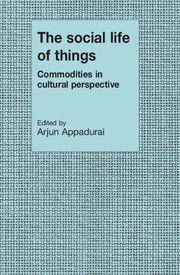Book contents
- Frontmatter
- Contents
- Contributors
- Foreword
- Preface
- Part I Toward an anthropology of thing
- 1 Introduction: commodities and the politics of value
- 2 The cultural biography of things: commoditization as process
- Part II Exchange, consumption, and display
- Part III Prestige, commemoration, and value
- Part IV Production regimes and the sociology of demand
- Part V Historical transformations and commodity codes
- Index
1 - Introduction: commodities and the politics of value
Published online by Cambridge University Press: 05 June 2014
- Frontmatter
- Contents
- Contributors
- Foreword
- Preface
- Part I Toward an anthropology of thing
- 1 Introduction: commodities and the politics of value
- 2 The cultural biography of things: commoditization as process
- Part II Exchange, consumption, and display
- Part III Prestige, commemoration, and value
- Part IV Production regimes and the sociology of demand
- Part V Historical transformations and commodity codes
- Index
Summary
This essay has two aims. The first is to preview and set the context for the essays that follow it in this volume. The second is to propose a new perspective on the circulation of commodities in social life. The gist of this perspective can be put in the following way. Economic exchange creates value. Value is embodied in commodities that are exchanged. Focusing on the things that are exchanged, rather than simply on the forms or functions of exchange, makes it possible to argue that what creates the link between exchange and value is politics, construed broadly. This argument, which is elaborated in the text of this essay, justifies the conceit that commodities, like persons, have social lives.
Commodities can provisionally be defined as objects of economic value. As to what we ought to mean by economic value, the most useful (though not quite standard) guide is Georg Simmel. In the first chapter of The Philosophy of Money (1907; English translation, 1978), Simmel provides a systematic account of how economic value is best defined. Value, for Simmel, is never an inherent property of objects, but is a judgment made about them by subjects. Yet the key to the comprehension of value, according to Simmel, lies in a region where “that subjectivity is only provisional and actually not very essential” (Simmel 1978:73).
In exploring this difficult realm, which is neither wholly subjective nor quite objective, in which value emerges and functions, Simmel suggests that objects are not difficult to acquire because they are valuable, “but we call those objects valuable that resist our desire to possess them” (p. 67).
- Type
- Chapter
- Information
- The Social Life of ThingsCommodities in Cultural Perspective, pp. 3 - 63Publisher: Cambridge University PressPrint publication year: 1986
- 1999
- Cited by

